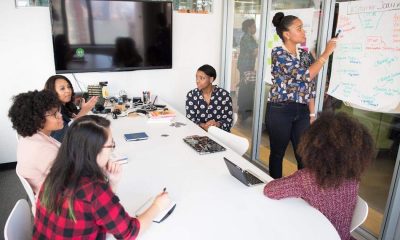People
Owner’s Magazine Best of: Business
Published
8 years agoon
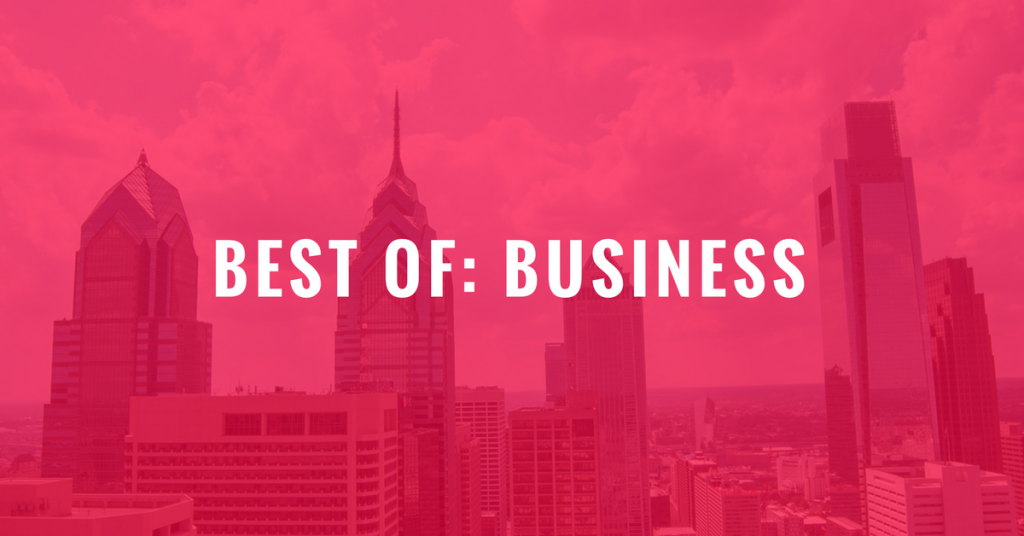
Owner’s Magazine has compiled a list of some of most inspiration businesses in Camden and beyond. All of these organizations reside either in Camden or in the trial-state region. Each business has been chosen based off of the following criteria:
Commitment to Community: Each business on this list has a social responsibility to better the community. As Camden continues to develop herself into a reputable city known for its illustrious history and growing startup culture, the city continues to need businesses that give back to better the community.
Industry Leaders: Whether you’re a small business or a Fortune 50 company, telling a story is important. For this year’ list of the top businesses in our region, we looked at businesses who were well respected within their industry and have been declared as industry leaders amongst their community.
Commitment to the Entrepreneurship Community: Each candidate has shown an extensive commitment to bettering the entrepreneurship community.
CONGRATULATIONS TO THE 2017 OWNER’S MAGAZINE BEST IN BUSINESS:
A.C. MOORE
A.C. Moore is a specialty retailer offering a vast selection of arts, crafts and floral merchandise to a broad demographic of customers. We opened the first A.C. Moore store in Moorestown, New Jersey in 1985, and have since grown to more than 130 stores. Our stores are located in the Eastern United States from Maine to Florida.
We are devoted to being our customers’ first choice for product selection, value and service that inspires and fulfills unlimited creative possibilities. We believe that our assortment, convenience, service and pricing differentiates us from our competitors. Our assortment of merchandise consists of more than 60,000 stock keeping units, or SKUs, with approximately 40,000 SKUs offered at each store at any one time. We also offer custom framing in the majority of our stores. In-store events and programs for children and adults provide hands-on arts and crafts experience and encourage the creativity of our customers.
ALLOY SILVERSTEIN
Our success is your success. We make your taxes easy, your payroll worry-free, and financial planning for your future our top priority – that’s the Alloy Silverstein advantage.
Officially formed in 1999, The Alloy Silverstein Group extends its service offerings for both business and individual clients. We encourage you to visit each division’s website to learn how we can benefit your entire financial picture.
AMERICAN WATER
We know just how important water is to daily life. It’s somehow involved in everything thing we do, everything we use. When you need it, you expect it to be there — and you expect it to be clean and safe. That’s what our skilled teams of experts care about most, and focus on every day. Our customers are our number one priority, and we are proud to deliver clean, safe, reliable and affordable water and wastewater services. In New Jersey we serve about 2.7 million people. To ensure your water is of the highest quality, we strictly follow regulations that are set by local authorities as well as federal standards set by the United States Environmental Protection Agency (USEPA).
ANCERO
Ancero helps businesses stay connected as their full-service, communications partner. Our award-winning Managed IT & Managed Communications solutions provide small to medium sized businesses technology services to drive growth, innovation and productivity.
Founded in 1999, Ancero utilizes their years of industry experience to incorporate the capabilities of diverse and emerging technologies to deliver strategic solutions that ensure operational excellence. Ancero’s team of professionals provides organizations from the Mid-Atlantic through the Northeast Corridor with innovative ways to enhance the scope, capacity and value of their investments in technology. As a family owned and operated business, Ancero takes pride in providing superior quality of service while exceeding customer expectations.
ARCHER AND GREINER
Archer provides a vast array of services and is experienced in nearly all areas of law. We provide full-service litigation and transactional capabilities in every one of our offices. Whether a corporation, government entity or individual, we have the knowledge and capacity to represent you. All of our clients receive expert legal services in every area of the law from commercial litigation to family matters from our team of more than 175 lawyers across four states: New Jersey, Pennsylvania, New York and Delaware.
BIG SKY ENTERPRISES
MIKE REGINA- PRINCIPAL BIG SKY ENTERPRISES
We went from working in the business, to on the business. We were able to expand; we have won multiple awards, and have been on Inc. 5000 the past two years. It’s a testimony to not only our process, but our people. Our people are amazing. They are all brought in on the vision and culture. We have 100% customer satisfaction, and that’s never going to change. We focus on them having a great time and enjoying the process. We want to celebrate the process and not stress it. We have clients that take us on vacation. We have been to fantasy camp. Were all about the Disney experience, it separates us from others and makes us unique. Forbes called us the “Disney of real estate.”
Q1. What can you attribute to your success over the years?
So, the success first and foremost, god has blessed us with. I’m a firm believer in god and religion. Secondly, my great partner, my brother, together we complement each other very wall. As I’m going through the wall, he’s going through the door. It’s good to have that compatibility, and to be relationship focused. We work so hard to build relationships. We build relationships, and just so happen to build buildings as well. It’s by delivering value to others, that’s been a huge part of it, providing a great culture and a great experience. Delivering a great product to our clients has been a great contributor to our success. People are what makes you.
When you can give them the ability to have responsibility, you set yourself up to expand.
Q2. How have you been able to expand your business over the years?
Honestly, it’s about making great decision at a certain time. It’s all about timing. Building relationships, creating my own network, this allows me to bring value to people that I couldn’t in another setting. There’s no structure, it’s all about just connecting people. And by doing that, it has allowed us to have introductions to project opportunities. We’re not bidding on projects, we’re moving forward with Big Sky, our relationships get us the deal. It’s because of our relationship. You can’t grow unless you grow your relationships. Two is better than one.
Q3. What would you say is the one that your business has done right?
Always doing the right thing, and the right thing by our client even if it impacts us financially. At the end of the day, a happy client, will lead to new business. So if I deliver on the client, and put the client’s interests first before mine, then I’m creating long term business. Business is not complicated, it’s not that hard. Do as to others as you want on you. Provide them with the ultimate experience, you want to be memorable. That goes to the person down to the valet, they are all an opportunity. Create the influence. Be the person that people want to call Mehran – he’s that guy, he’s the go to, he’s the great guy, always connected, and surrounded by good company. Always surround yourself with people better than you. Leadership 101 – never be intimidated by it, but embrace it.
B&N PIANO
B&N Piano Sales and Service, Inc. is a family owned and operated moving business with over 30 years of experience. We are committed to offering the very best to each and every customer. We are based in Southeastern Pennsylvania and are just minutes away from Philadelphia, New Jersey and Delaware state lines. We not only care about our family members but also care about your pianos and will respect your homes/business.
The Bridal Manor
Miranda Steinman, Assistant Manager, The Bridal Manor, Sewell, NJ
The Bridal Manor is a locally owned and operated bridal boutique offering wedding gowns, bridesmaid gowns, mother’s gowns, prom, formalwear, and tuxedo rentals. Located in a beautiful Victorian home, the boutique has a relaxed and comfortable atmosphere allowing you to choose your dream gown with ease. The Bridal Manor has a wide selection of styles and sizes so that any woman can feel beautiful while shopping for her wedding dress. Appointments are required to ensure a perfect shopping experience.
What can you attribute to your success over the years?
Here at The Bridal Manor, we strive to give the absolute best customer service to each of our brides. We provide a low pressure and relaxed shopping environment which differs from the experience our customers receive elsewhere. This is a refreshing change for brides who are going through the stressful process of planning a wedding. Because we are not a high pressure selling environment, we are able to build trusting and meaningful relationships with our customers. We want to empower everyone who walks into our boutique to feel special and beautiful in the gown of their dreams.
How have you been able to expand your business over the years?
The Bridal Manor has been in business for almost 20 years, which has allowed us to become a household name locally. However, by doing business for so long in a certain way, it is sometimes difficult to grow and evolve. When I joined the team 9 years ago, I knew that we needed to improve on our online presence. I slowly began to incorporate social media into our business which allowed us to promote events and to spread our name beyond the Washington Township area. We also participate in wedding expos in several towns giving us the opportunity to speak to potential clients from all over the South Jersey and Philadelphia regions. We have acknowledged that in order to expand, we must be willing to adapt. I am constantly researching trends and scouting Pintrest boards to make sure we are carrying the styles that are being shown online. We have recently expanded our plus size sections in order to accommodate all shapes and sizes and ensures that all women who shop with us feel amazing.
What would say is the one thing that your business has done right?
The one thing that we have perfected is our process. We have very clear and structured selling, ordering, receiving and follow-up processes. Through this, we are able to minimize errors and ensure efficiency. I think sets us apart from newer stores because they are still trying to figure out what works best, and this leaves a lot of room for error. The wedding industry does not allow for mistakes because we are dealing with the most important day of people’s lives. Our experience and longevity give our customers peace of mind when they are shopping for their wedding attire.
CAMDEN PRINTWORKS
ADAM WOODS, CHIEF EXECUTIVE OFFICER, CAMDEN PRINTWORKS
Q1. What can you attribute to your success over the years?
A great team is probably number one. If you got the right people working with you, you’re going to be successful. I would say number 2 is focusing on the quality of what we do. More than pricing, more than costs, more than any of that. For me, quality is just number one. That’s how you get repeat business, and referrals. We think in terms of partnerships and relationships.
We create the good, the true, and the beautifully, for the reasonable, the adequate, and the pretty. There are a lot of folks who you can be doing a great job for, and they’ll move on to someone who does an adequate job so that they can save a nickel. I don’t really understand that position, and I’m not interested in understanding that. Financially, it bites me in the ass every now and again. That’s true nationally, I try to offer healthcare, but I can just barely afford it, and that we’ve created a deregulated system, where big businesses don’t have to compete in the way small businesses do. Big Bizz writes the policy. Here in Camden, we have trouble every time we turn around, and meanwhile big companies can move in and get all sorts of great things and change the fabric of the neighborhood. It feels like someone is rolling out the red carpet for big business, and not for the little guy.
Q2. How have you been able to expand your business over the years?
The biggest expansion we have made is moving into a larger building back in 2014. We increased the space; our current space is 5x times big than the old space. Tons of new room, more equipment, more room to work efficiently and effectively. We’ve made a couple mergers and acquisitions over the years. Some went well and some haven’t. We learned a lot of from and experienced top line growth. It will help in our future growth.
Q3. What would you say is the one that your business has done right?
Family. We treat our staff and customers like a big family. We all eat lunch together every Friday. People bring their family to work on certain days. We all play basketball every day when the weather is good.
CATHEDRAL KITCHEN
NOREEN FLEWELLING, DEVELOPMENT DIRECTOR, CATHEDRAL KITCHEN
Q1. What can you attribute to your success over the years?
We are a very well run organization with a volunteer structure. Our mission is very clear; we use food to change lives. Sticking to our mission of using food to change lives. We do that in a variety of ways. Cathedral Kitchen feeds over 315 people a day. We train people with food. We train 60 people per year in our culinary program. We have a dedicated staff of 42 employees. 25 of them are either graduates of our program, or Camden County residents. We are very fortunate, having generous donors, and large providers of food that donate to us.
Our biggest challenge is serving our guests that can’t get to the kitchen. We expanded our outreach to seniors and to those that face challenges getting to our kitchen. We are looking to expand our outreach. We currently provide to schools for their afterschool programs, and to two senior centers, which we provide groceries too on a weekly basis.
Q2. How have you been able to expand your business over the years?
In 1976, there was a group of young adults who went to Philadelphia to hear Mother Teresa speak and they were so moved by her words that they came back to Camden and went around to a couple of churches and groups to raise money to feed the poor out of the trunks of their cars. Over the years, we have had different spaces that we rent, the building in which we are currently in has been built in 2009. When we built this building, we built a beautiful kitchen, in which we created the culinary training program. We have a health suite also, where we have a dental clinic that’s free for Camden, Pennsauken, and Gloucester city residents. Recently, Project Hope has provided us with a medical practitioner. We have been able to expand our health services, and job training programs. In the end of 2014, we started the social CK café, and contract meal program. It is with volunteers of America. We are able to provide 1600 meals a day for children and individuals at halfway houses.
Q3. What would you say is the one that your business has done right?
Always treating our guests with compassion and dignity. We have over 8000 volunteers to run our meal program. To us, the most important thing is: our interactions with our dinner guests. Treating them with respect and compassion.
CENTER FOR FAMILY SERVICES
RICHARD STAGLIANO, PRESIDENT & CHIEF EXECUTIVE OFFICER, CENTER FOR FAMILY SERVICES
I am the president and CEO for CFS and I have been with this organization for the past 35 years. I have been a part of developing and expanding the organization and its services to children and families and individuals in Camden city, and southern New Jersey in general. Our goal is to break the cycle of poverty, violence, trauma, and addiction. All to help our people overcome obstacles, to find comfort, and to build the foundation for a successful future.
Q1. What can you attribute to your success over the years?
Here at the Center For Family Services: we have a mission, a charitable organization that tries to help people improve their lives. With families that have been facing environmental challenges, from people who have started with problems since the day they were born. We’re a professional organization which provides professional help to individuals who have been disadvantaged, to teenagers who have had behavior problems, to people who have been removed from their families. We were a staff of about 20 people and had a budget of $300,000. Now we have offices in Camden and have reached over 800 staff members in the organization. With over 60 programs, we have 30 different sites, and we do a lot of in home work as well. We have a budget of over $40 million now. Success has been being true to our mission. We have strong values about social justice, and about professional services. Having services and programs that truly have positive outcomes and results. Every dollar given to us is spent wisely. We deliver on what we are saying we are going to do. We do everything with great ethics and integrity.
Q2. How have you been able to expand your business over the years?
Were aggressive about searching for grants and dollars. When we see a community need, we want to address that need if it fits into our mission. We’ve been able to expand because we work very hard and commit to what we say, so then funders want to invest in our organization. We help to build collaborations with others in the community. It helps to have positive outcomes and results. We have been able to expand on what works. I do want to emphasize that collaboration with other people is very important in what we do. That’s with everyone ranging from people in politics, to community officials, to other nonprofits. With the community itself, we can be much more effective when the people we are helping feel engaged. It’s a process they can contribute too. It will empower community engagement.
Q3. What would you say is the one thing that your business has done right?
I would say that our focus on ethics, best practice, integrity, and having a culture in the organization amongst all staff levels and board of trustees, has led to our achievements. We have stayed in Camden and kept our headquarters in Camden, with roots back to 1920. We engage consumers in helping. There are colleagues that want to help. We meet real needs. Respecting each other and working with one another. Our major goal is to 1) help empower people and it’s to help people feel better about themselves. To take action, to help improve their lives. Helping people to improve their self-esteem so they can succeed and obtain an education. Healthy relations and everything that makes life more successful is what we strive for. Respect for diversity across all the entire organization. There is a multiplier effect of helping someone in need. Helping someone get their life on track, they will do the same for someone else in need.
CHEF’D
Flipping through a magazine one day, our founder and CEO came across a truly mouth-watering recipe, and wondered, “Why can’t I literally press a button and have this gourmet meal shipped to my door?” A year later, Chef’d was born, designed as a meal kit company like no other, where the choice is truly in the hands of the consumer. With no subscriptions, the ability to re-order your favorites, and a selection of over 300 meals, Chef’d is changing the meal kit landscape one delicious meal at a time.
CITY INVINCIBLE
City Invincible is comprised of 4 Regional design firms that has a combined total of over thirty years of project collaboration. The combination of City Invincible’s combined size, expertise, and experience positions the firm to creatively and economically address the complexities of today’s specialized building types, codes, and client expectations. City Invincible serves the following markets: multifamily and mixed use residential, senior living, hospitality, healthcare, and education. As part of the company vision, City Invincible plans to increase its involvement in the city renaissance both professional and on the charitable side.
COMCAST
Comcast Corporation (NASDAQ: CMCSA) is a global media and technology company with two primary businesses, Comcast Cable and NBC Universal. Comcast Cable is one of the nation’s largest video, high-speed Internet and phone providers to residential customers under the XFINITY brand and also provides these services to businesses. NBC Universal operates news, entertainment and sports cable networks, the NBC and Telemundo broadcast networks, television production operations, television station groups, Universal Pictures and Universal Parks and Resorts.
CONNOR STRONG AND BUCKELEW
Conner Strong & Buckelew is among America’s largest insurance brokerage, risk management and employee benefits brokerage and consulting firms. The firm is an industry leader in providing high-risk businesses with comprehensive solutions to prevent losses, manage claims, and drive bottom line growth. Its employee benefits practice focuses on providing best-in-class benefits administration, health and wellness programs and strategic advisory services.
The company provides insurance and risk services to a wide-range of industries including but not limited to aviation, construction, education, healthcare, hospitality & gaming, life science & technology, public entity and real estate. Additionally, Conner Strong & Buckelew and its affiliates offer a number of innovative and specialty solutions which include captive strategies, construction wrap-ups, executive risk, safety and risk control, and private client services.
COOPER HEALTH
Cooper University Hospital is a dynamic, integrated health care delivery system that provides comprehensive medical services to the residents of southern New Jersey. As the clinical campus of Cooper Medical School of Rowan University, Cooper University Hospital is dedicated to medical education and research excellence. Cooper University Physicians, the teaching faculty of the medical school, maintains more than 100 offices at 38 locations throughout southern New Jersey and in Pennsylvania.
COOPER RIVER DISTILLERY
Cooper River Distillers is the first legal distillery in Camden, NJ ever!
All of our spirits are hand-made from scratch in downtown Camden, New Jersey and distributed to bars, restaurants, and liquor stores in South Jersey.
COOPERS FERRY
Cooper’s Ferry Development Association (CFDA) was founded in 1984 as a private, non-profit corporation dedicated to coherently planning and implementing high-quality urban redevelopment projects in order to help replenish Camden’s depleted tax base and to create a significant number of jobs for city residents.
From 1984 until 2000, CFDA worked to fulfill its mission by concentrating solely on the redevelopment of Camden’s downtown waterfront. Serving as overall planner, promoter, and master developer, CFDA has attracted and coordinated more than $600 million of private and public investment to the Camden Waterfront. With this focused approach, CFDA has successfully put in place the building blocks for a vibrant, mixed-use waterfront community, which is anchored by family entertainment venues, office buildings & residential lofts. Most recently, CFDA has partnered with neighborhood groups and residents throughout Camden in the planning and implementation of community driven plans.
DRANOFF PROPERTIES
We build, develop, manage, market and own landmark properties that revitalize neighborhoods and remake city skylines. We immerse ourselves in every detail of every project, because every project must be without peer. We don’t do ordinary.
EMR EASTERN
Our core business is the recycling of scrap metal from a range of sources such as End-of-Life vehicles/consumer products, industry, construction and demolition. This results in sales of recycled commodities of around 10 million tons a year. We have extensive ferrous and non-ferrous operations worldwide and produce over 100 grades of high quality recycled materials which are taken to market by our substantial road, rail and shipping network.
FIRSTPICK
Firstpick is a freelance marketplace where students in the creative fields can receive professional experience and payment for their work. This is one of the first student lead startups within the city of Camden. Their headquartered inside the first innovation and technology lab in Camden, Waterfront Lab. Clients who use this platform will greatly benefit due to FirstPick’s through vetting process and guaranteed professional grade work all at a competitive price.
HARDENBERGH INSURANCE GROUP
The Hardenbergh Insurance Group has been a family owned and operated company for three generations. In over 60 years of business in the Delaware Valley we have focused on insuring futures of both business and families. The tradition and culture created in 1954 still continues today.
At Hardenbergh we use our 60 years of experience in the insurance industry and leading-edge technology to provide a strategic plan to best meet the needs of our clients. Our staff expertise extends to all varieties of insurance coverages and allows us to keep pace in this continually evolving industry. Our unique culture has enabled us to quickly adapt our services to satisfy our customers.
Our agency provides the best solutions for your insurance and risk management planning. We utilize the industry’s top providers, and our dedicated staff creates cost effective, tailored service plans to protect your families and your financial and business goals. We are proactive for you, year round, which is the best strategy for your success.
HOLTEC INTERNATIONAL
Holtec International is a diversified energy technology company with its headquarters located in Jupiter on Florida’s “Treasure Coast”. The company is widely recognized as the foremost technology innovator in the field of carbon-free power generation, specifically commercial nuclear and solar energy.
HOPE WORKS N’CAMDEN
Dan Rhoton, Executive Director, Hopeworks ‘N Camden
Q1. What advice would you give to younger business professionals?
A1. Simply, your skillset is the least important part of you as a professional. The most important part is to meet people and ask questions. How do I, who should I ask, what do you know. The content is less important than the willingness to learn. To take feedback and learn from it. Most of the skillsets our young professionals will learn are going to be outdated. The questions you ask and the willingness you have to learn will get you very far.
Q2. What’s the one thing that young entrepreneurs should focus on in 2017?
A2. Solving problems, at the end of the day that’s what matters most. A product that solves a problem. If an entrepreneur has a product that solves a problem, you will become successful.
Q3. What has been a mistake that you made early on that you wish you knew today?
A3. I assumed leaders in the field didn’t want to talk to me or didn’t have the time to talk to me, so I didn’t ask. When in fact leaders in the field not only want to talk to you, they are anxious to do so. A lot of people make assumptions that he or she doesn’t have time, and they never ask. If you don’t ask, the answer is always going to be no. When you do ask for help, you know what you want. One of the key scopes is to ask for what I want, ask for what I need, and to be clear about it.
HUTCHINSON HEATING AND COOLING
Hutchinson is among an elite group of HVAC contractors in New Jersey credentialed to provide Home Performance with Energy Star services to Gloucester, Camden, and Burlington counties. With a “whole system approach” Hutchinson can offer the most energy savings, best comfort and air quality for AC or heating systems.
INTEGRITY STAFFING
We generate opportunities for people to exceed their own expectations, and advance careers, companies and communities.
KINGSWAY LEARNING CENTER
CHRISTINE ROBINSON, EXECUTIVE DIRECTOR, KINGSWAY LEARNING
Kingsway Learning Center has been around for 50 years, we provide services to individuals with special needs. Our program has evolved in the last 50 years. It started as a Saturday class in a garage and there weren’t a lot of services around at that time. From birth to age -21. Our main campus is in Haddonfield, where we have early intervention birth to 3 program. Home programs. We have our program from 3-15 preschool thru junior high. We recently opened our Moorestown campus serving individuals ages 15-21.
Q1. What can you attribute to your success over the years?
Probably, it’s the individualization of service. You may think that after meeting one person with autism, you met them all. That isn’t the case. Our students are all totally different. We adapt to each child, and their individual needs. We empower our staff to take risks and try new things. Really get out there and work with the kids and be creative. Individualization is our goal to success.
Q2. How have you been able to expand your business over the years?
When we started, it was just a Saturday play group to support families, and it progressively expanded to meet the needs of the community. The first program that opened up was in Haddonfield. We are in what used to be an all-girls catholic high school. All research indicates the earlier you intervene, the better you can help. There was a lot of demand to expand beyond the elementary years. 12 years ago the Moorestown program opened. We have been filled to capacity. We will be providing services beyond the age 21. Overall in terms of expanding, we’re always looking to answer the needs in the community. The types of the students we provided service to 50 years ago, is different now. We keep the communication in the community. Our big program is called CBI, some of the kids will go out to a job site with a job coach. Essentially they are unpaid employees of the job site and their coach provides support for them.
Q3. What would you say is the one thing that your business has done right?
We always cater to the student. It’s always about the student. It’s all about the children, our focus is on the student. We average about 250 children in all of our programs. A key component of our program is regular communication between school and home.
One thing that makes us stand out, is the amount of technology that is available to our students. Our kids are gaining opportunities with the technology that is available.
LAW OFFICES OF LYNDA HINKLE
LYNDA L. HINKLE, PRINCIPAL ATTORNEY, MANAGING PARTNER
Q1. What can you attribute to your success over the years?
I think probably the biggest thing is just working hard and working steady. Not ever giving up. The demands of the type of work that I do are pretty high. I think some people give up before they reach a level of success. I have seen a lot of people come and go due to the hard work that practicing law requires. When I first started my business, things didn’t happen normally for me. I came out of school at the worst time in legal history. I started my practice because I didn’t really have a choice. I remember my husband said “remain flexible when things don’t go the way you expect them to go.”
Q2. How have you been able to expand your business over the years?
The largest part of my expansion is not seen with the eyes. Real expansion is in clients, who you can’t really talk about because of confidentially. I expanded the practice areas that I work in; we recently have labor unions as clients, and some towns. We represent them and meet certain goals. It’s a little offshoot of the law practice. I think that they are equally difficult and not difficult. There is a certain formula in all law practices, and even human affairs. The difficulty lies in individual circumstances, and bringing clients to an understanding that is helpful to them, that may not initially meet their goals. They may be emotional and not understand upfront, but in the long run it is best for them. The most rewarding thing is bringing someone to his or her long-term goals. It’s rewarding.
Q3. What would you say is the one that your business has done right?
We have always kept the client as the most important thing. Which isn’t always true in law, when the bottom line is more important, but the most important thing is taking care of your client. You can’t always satisfy people when it comes to law, because there is someone in a black hole that makes decisions that you can’t control. Going in front of judge a, then judge b, can be different, they have separate ideas. Sometimes client need someone to blame. The best thing to do is prepare clients for what the likelihood of success is, whether it be the financial expense if they pursue a certain course of action, will it come back to them, or will they lose money. Judges are a wild card. All you can do is comfort the client. Provide suggestions on how to deal with what they have been handed.
LEAP ACADEMY
LEAP Academy was one of the first thirteen charter schools that opened in New Jersey in 1997 and the first charter school in Camden City. It is one of the few charter schools in New Jersey offering a comprehensive K-12 program. The School was housed in temporary modular classroom units in 1997. Since then, it has acquired five buildings along Cooper Street. The presence of LEAP Academy has added a vibrant K-12 presence to Camden’s “Education Corridor,” which also features campuses for Rutgers University, Rowan University, Camden County College, and the Rutgers Early Learning Research Academy (ELRA). The location of LEAP Academy alongside three institutions of higher education allows for Camden children to start their education in infancy with ELRA, proceed to the LEAP Academy and transition to higher education all along Cooper Street.
LIBERTY PROPERTY TRUST
As an extension of this promise, Liberty is one of the nation’s leading developers of high-performance green buildings. Liberty’s more than 728 industrial and office properties offer exceptional locations, flexible design, thoughtful amenities, cost efficient operations and state-of-the-art technology to the company’s 1,700 tenants. Liberty continuously increases the value of its portfolio through expert management, marketing and development.
LINKED NOODLE
Linked Noodle is a platform that connects people who teach, to people who want to learn. Say you wanted to learn how to play the piano. Right now your only options are to type “piano teacher” into google, watch tutorials on YouTube, or go to school for a literal degree in music. Linked Noodle offers people with hobbies and skills a way to make money on the side doing the things they love. You shouldn’t need a degree in music to teach someone how to how to sight read, and you shouldn’t have to go for a formal music degree to want to learn how to play. Linked Noodle is our alternative to that. Unlike other online resources that rely heavily on online tutorials, Linked Noodle connects you with a teacher in your local community. The process starts online but ends in a tangible connection.
LOCKHEED MARTIN
Helping the future arrive is what we do. We solve the great problems of our times. We create the innovative technologies that define eras. While no one knows what’s going to change the world next, we’re probably already working on it.
LOURDES HEALTH SYSTEM
The Lourdes Health System is one of the region’s leading healthcare providers, recognized nationally for excellence in clinical care and service to the community. The system has two general acute care hospitals, located in Camden and Willingboro, New Jersey, and a growing network of ambulatory care facilities and physician practices located throughout southern New Jersey. A major teaching affiliate of the Rowan University School of Osteopathic Medicine, Lourdes provides a full range of medical, surgical, obstetrical, behavioral health, rehabilitation and long-term acute care services. The Lourdes Cardiovascular Institute is recognized nationally for excellence in heart care. Lourdes Health System has an Accountable Care Organization (ACO), Nursing School; comprehensive Wellness Services; and LIFE program for All-Inclusive Care of the Elderly. Lourdes is well-known for its outreach services, providing care to those most in need.
NJEDA
if you are a business in need of financing to grow in New Jersey, a not-for-profit organization seeking capital to expand community services, a municipality looking to attract a major corporation within your boundaries, or a developer requiring funds for a major redevelopment project, the New Jersey Economic Development Authority (EDA) is ready to put its resources to work for you.
With our large portfolio of varied programs and services, the EDA can assist you with access to capital, including tax-exempt and taxable bond financing, loans, loan guarantees, and business and tax incentives. In addition, we offer real estate development assistance and state-of-the-art technology facilities like the Technology Centre of New Jersey in North Brunswick.
PHILADELPHIA 76ERS
The NBA franchise actually began in 1949, when six teams from the Midwest-based National Basketball League joined the Basketball Association of America to form the 17 team National Basketball Association. One of those teams was the Syracuse Nationals, which eventually became the Philadelphia 76ers.
In the spring of 1963, the Syracuse Nationals were purchased by two Philadelphians, Irv Kosloff and Ike Richman, and the NBA approved the franchise shift formally on May 22.
The franchise then held a contest to name the club and on August 6, 1963, the Nationals changed their name. The late Walt Stahlberg, of West Collingswood, New Jersey, won the contest, of which 500 different suggestions were entered.
Stahlberg was one of several who picked the 76ers. However, his accompanying 25-word explanation was deemed the best by the judges, and he and his wife received an all-expense trip to the West Coast to see the newly-named 76ers play San Francisco.
PLASTICS CONSULTING
Bruce Muller is the president and founder of Plastics Consulting. He has worked over 45 years in the plastics industry. He has experience in manufacturing, laboratory, product development, formulating, equipment design, sales, and executive management. Bruce is the founder and former president of Accurate Color and Accurate Compounding that serviced molders in 18 countries around the world for 19 years. In 1995 both companies were sold to a competitor. Bruce started Plastics Consulting in 1995 and since then has dedicated himself to designing research equipment and consulting to solve production problems and advance the plastics industry. He is recognized internationally as an expert in colorants and rotational molding. Bruce has been active in SPE for 44 years and ARM for 32 years.
Pls.MD
Plas.md is a Philadelphia, Pennsylvania-based creative studio focused on developing innovative immersive solutions for health, wellness, and education. We are a mix of engineers, artists, biologists, game designers and storytellers who expertly blend cutting edge technologies with frictionless user experiences to create applications that provide value to our clients and improve the quality of life for our users.
RESINTECH, INC.
ResinTech Inc., an acknowledged leader in ion exchange, manufactures a broad range of ion exchange resins for water and waste water treatment, including deionization, softening, metals removal, product purification, resource recovery, and pollution control. In addition to its ion exchange resins, ResinTech supplies activated carbon and inorganic selective exchangers. ResinTech has developed an application technology resource group that includes state-of-the-art laboratories and a group of scientists dedicated to expanding the frontiers of application technology. This group is put to use whenever product or process recommendations are requested, assuring customers get the most cost-effective approach to achieving their process goals
ROTHMAN INSTITUTE
To provide our communities with high quality, compassionate, and affordable musculoskeletal care that is grounded in evidence based medicine, the results of which will exceed expectations.
RUTGERS UNIVERSITY CAMDEN CAMPUS
The work we do on our 40-acre campus along the bustling Camden Waterfront is felt far beyond. We educate students for successful careers and productive citizenship. We support a faculty of sharp thinkers who turn new knowledge into creative solutions. And we share our expertise with partners—local and global—to improve
SAXBY’S
Our mission to Make Life Better permeates through everything we do. We pair the local, friendly atmosphere of a neighborhood café with consistently delicious products you’d find at a big name coffee shop. Saxby’s offers expertly roasted coffee products, all natural smoothies, hand-made sandwiches and made-to-order breakfast. We live our core values by remembering our guests’ names and orders, partnering with local businesses and volunteering in the community.
SUBARU OF AMERICA
Founded in 1968, Subaru of America, Inc. (SOA) is the U.S. Sales and Marketing subsidiary of Fuji Heavy Industries (FHI) of Japan and is responsible for the distribution, marketing, sales and service of Subaru vehicles in the United States.
Subaru Product Line
Equipped with unique SUBARU BOXER® engine on all models and Symmetrical All-Wheel Drive on most, the Subaru product line, renowned for durability, reliability, traction and “active safety,” represents one of the highest repurchase-loyalty ratings in the U.S. market. Today, the Subaru product line includes the Impreza, WRX, STI, BRZ, Legacy, Outback, Forester, and Crosstrek.
Corporate Headquarters
Subaru of America, Inc. moved from its current Cherry Hill, NJ, fate Camden, NJ in 2017. The company markets Subaru vehicles, parts and accessories through a network of approximately 600 retailers across the United States.
TICKETLEAP
It’s experiences, not things, that provide the lasting memories. Events are organized experiences and we want more of them to exist in this world by inspiring and empowering the passionate people that create them.
VOLUNTEERS OF AMERICA DELAWARE VALLEY
Presently, we operate 44 separate programs serving persons who are experiencing homelessness, seeking permanent housing, struggling with addictive behavior, coping with chronic mental illness and developmental disabilities, returning to society from the criminal justice system, and dealing with domestic violence.
WATERFRONT MEDIA
Waterfront Media is a design agency located in Camden, NJ that strives to help brands create a cohesive and complete digital strategy that includes exceptional design, programming, branded content, and creative story-telling.
Waterfront Media believes the world would be a better place if everything were designed to make an impact. Their purpose is to deliver exceptional design to every brand, every company, and every organization that they come across.
WATERFRONT VENTURES
Developing a culture by bringing more fun, innovation, and connections to the Waterfront. Waterfront Ventures is also providing education and resources for Startups & Entrepreneurs. Programs such as:
- Startup Conferences
- Entrepreneurship 101
- Demo Weekend
- Startup Tours
- Waterfront Lab Day
- Light House Mentorship
WAWA
Today, Wawa is your all day, every day stop for fresh, built-to-order foods, beverages, coffee, fuel services, and surcharge-free ATMs. A chain of more than 645 convenience retail stores (over 365 offering gasoline), Wawa stores are located in Pennsylvania, New Jersey, Delaware, Maryland, Virginia and Central Florida. The stores offer a large fresh food service selection, including Wawa brands such as built-to-order hoagies, freshly brewed coffee, hot breakfast sandwiches, built-to-order specialty beverages, and an assortment of soups, sides and snacks.
You may like
Lifestyle
Lesbian Bars Were Dying. Now They’re Making a Comeback
Published
2 months agoon
May 29, 2025
The buzz on the headlines these past few years makes it impossible not to notice: “Only 21 lesbian bars remain in America,” or “The rise and fall of America’s lesbian bars,” and “Why lesbian bars are disappearing.”
The once-thriving niche of lesbian bars has indeed dwindled. The ones that remain have become clandestine tourist destinations littered around the heartland. These last bastions of the lesbian community are now few and far between.
However, we see a glimmer of hope with recent developments. It could be that grassroots campaigns are poised to save lesbian bars from the brink.
Let’s back up a little.
The origin of lesbian bars
If you’re a fan of Moulin Rouge (or French history, I guess), you might know a bit about the inception of the modern lesbian bar. Artist Toulouse Lautrec often chronicled the lesbian nightlife in turn-of-the-century France. Bars like Le Rat Mort were owned and frequented by lesbians.
This phenomenon spread to other areas of high society in the early 20th century. In Weimar Germany, lesbian entrepreneur Elsa Conrad owned multiple such bars. Bars for women were a rarity in the US at the time, but the upper-crust Cafe des Beaux-Arts, which operated in New York from 1911 to 1921, is cited as an early example.
Prohibition and its aftermath
When we talk about the modern history of lesbian bars, the clock usually starts after Prohibition’s repeal in 1933. Bars like Roselle Inn in Chicago and Mona’s in San Francisco opened shortly thereafter.
It’s worth noting, however, that lesbian bars truly started to pop up during Prohibition. Where women had previously been legally discouraged from drinking, the total prohibition of alcohol was ironically an expanding force. Women could drink freely in speakeasies, and even own them.
The lesbian bars that sprang up after Prohibition were the offspring of the lesbian speakeasies that came before, such as Eve’s Hangout, which was shut down after a 1926 police raid.
The golden age of lesbian bars
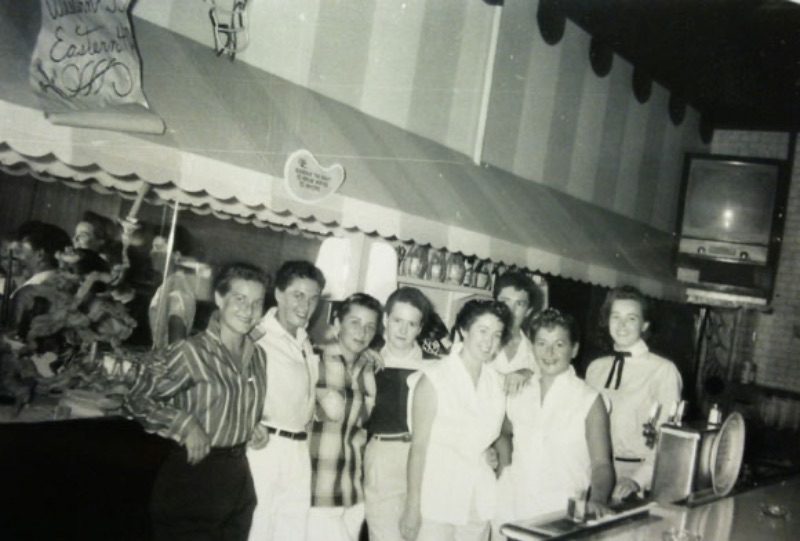
Lesbian bars and communities continued to grow, aided by the growth of cities and economic prosperity that followed World War II. Bars of this era still faced plenty of threats. Gay activity was still criminalized, organized crime was eager to capitalize, and internal debates split the community in twain.
In the ‘50s, de facto segregation and economic inequality kept many Black lesbians out of major lesbian bars. So did rigid attitudes about lesbian coupling built around butch/femme (or stud/femme) binaries.
Gay rights!
The first lesbian political organization, the Daughters of Bilitis, was formed in 1955. This was an early motion in the broader LGBTQ+ rights movement, which shone a national spotlight on lesbian and gay communities.
As the movement grew throughout the ‘60s, so did identification with/interest in lesbianism. As lesbian feminism developed in the ‘70s, lesbian bars became activist spaces in addition to social ones. By the ‘80s, there were over 200 lesbian bars nationwide.
There’s just one problem, and it’s a problem that emerges any time social spaces become political ones: politics create conflict. Divisions bubbled over who should and shouldn’t be included in lesbian spaces, from trans women to straight “political lesbians.” This fed into the damaging notion that “lesbian” itself was an exclusionary term.
The slow, painful fall
These divisions persisted, but lesbian bars remained fairly prevalent throughout the ‘80s and ‘90s. New movements led to new expansions. The Combahee River Collective helped open doors for lesbians of color. The community was ravaged by the AIDS crisis, but activism on that front helped bring the broader LGBT community together. By the mid-’90s, the Lesbian Avengers were bringing lesbian issues to the forefront of the community.
So, what did kill the lesbian bar? 9/11? The recession? Is it somehow Ellen’s fault?
The truth is, there was no one incident that sent lesbian bars into freefall. The more society as a whole accepted lesbians, the more patronage for these tight-knit neighborhood bars dwindled.
Meanwhile, over the course of the ‘00s, people kind of stopped meeting each other in person. The social role that lesbian bars once played could now be fulfilled much more accessibly by online forums, and later social media.
Statistics show that interest in the “lesbian” label itself may have declined in the ‘00s and ‘10s as well. Post-lesbian discourse has tended to frame the label as too exclusive. While the broader LGBTQ+ community experienced substantial growth in the 21st century, the lesbian community didn’t share in the majority of those gains.
The ravages of COVID-19
Articles about the dramatic decline in lesbian bars started to pop up in the late ‘10s. In 2019, it was estimated that only 15 such bars remained; in fact, there were 21. A string of closings occurred throughout the 2010s as business dwindled and rents increased.
When COVID hit, activists like Erica Rose and Elina Street sounded the alarm. Rose and Street initiated the Lesbian Bar Project, a fundraising campaign aimed at preserving the remaining bars.
Lincoln, NE’s Panic Bar closed in November 2020. In Philly, Toasted Walnut shuttered in February 2021. Even as the Lesbian Bar Project and other campaigns shone a national light on the issue, it seemed like the institution was quickly becoming a thing of the past.
But wait, there’s more?
A confluence of factors led to increasingly dire conditions for the country’s remaining lesbian bars. Pandemic-era restrictions were the final straw for many. But then, something shifted.
See, the pandemic may have kept us apart from each other, but it also reminded us how much we miss sharing a space. As restrictions were lifted, grassroots movements started to form dedicated to providing new, in-person social spaces for lesbians.
The lesbian bar revival
As the tireless work of the Lesbian Bar Project kept the remaining bars afloat, social groups and pop-ups started to form across the country. Lesbian Social Detroit. SHELiFE in Miami. Sip City Mixer here in Philly.
These groups coordinate regular events that go beyond the narrow scope of a bar: picnics, beach parties, sporting events. At the same time, they reflect a growing, vibrant, and (contrary to the popular stereotype) inclusive lesbian community nationwide.
As You Are in DC began as a pop-up series, but has now set up a permanent home. The Sports Bra, the first women’s sports bar, is now open in Portland, where another lesbian bar (Doc Marie’s) is opening just this week.
You can thank Lesbian Bar Project for their tireless work keeping remaining lesbian bars alive. You can also thank the internet which, once thought a detriment to the lesbian label, has now invited a new generation of lesbians to flourish.
Looking ahead, more of these pop-ups are trying to set up brick-and-mortar locations. Dave’s Lesbian Bar in Queens is fundraising at its monthly events; so is Hot Donna’s in LA.
Thanks to a renewed focus on community organizing and mutual aid, things are finally looking up for the humble lesbian bar.

We’ve all seen it before: the tale of the gauzy self-made business entrepreneur swept into fame and wealth, touting a name for themselves, only for it all to come crashing down suddenly. In their joyride, the protagonist figure realizes that beneath the world of dizzy glitters, there’s a saddened space of existence reality awaiting, of gaping shadows where life isn’t as pleasing as it seems to be.
Experiencing poverty is, without a doubt, a challenging feat in itself. Being born into it, experiencing success, fame, then losing it all and falling back into poverty is what must be especially difficult. Where the majority see this cliche in fiction or television, some are unfortunate enough to experience it firsthand.
This is the story of Wally Amos, of the Famous Amos fame.
Who is “Famous” Amos?
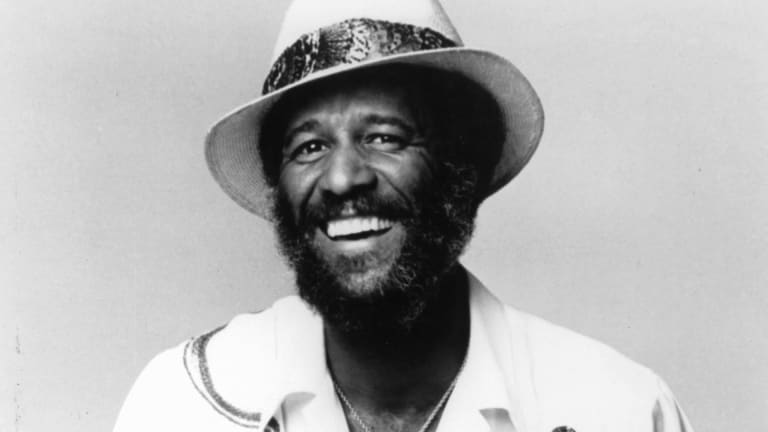
When it comes to feelings about Famous Amos, I imagine people typically fall into one of three groups:
The first group—being made up of mostly young people (probably; I’ve no data)— has zero knowledge of the brand at all. If the name doesn’t conjure visions of second-rate vending machine options (D4 at best), then you’re likely in this group.
The second group knows of Famous Amos and is familiar with its underwhelming status as a dollar store checkout counter snack food. Reasonable.
But the third group has a different view of the matter. A much more romantic take on the treat. Because this group remembers Famous Amos as a mouthwatering gourmet delicacy. A top-shelf cookie purveyor with an outspoken, charismatic owner in Wally Amos.
Why such a harsh disparity? How can a company less than 50 years old have such contradicting reputations among different generations?
There was a time, just a few decades ago, when Amos was a household name. A successful brand with big-name celebrity investors, upscale distribution, and a first-year total sales revenue of $300,000.
But by the mid-80s, the brand was hemorrhaging money. Amos would lose his house and eventually sell a majority stake of the company. Many people were left to wonder: How did one of the most successful snack companies of the last decade so quickly decay into financial shambles?
How did Amos find himself on the butt-end of a bad break?
These are interesting questions, and sure to be answered. But first, it’s worth understanding Famous Amos’ rise to popularity, understanding what made this gourmet cookie company so successful, so, well— I’m not gonna say it, I am not going to—famous.
Wally Amos’ Rise to Fame
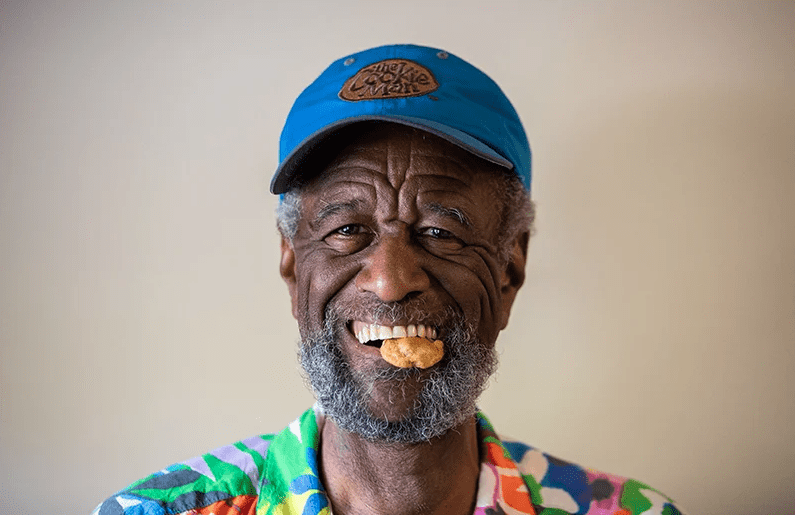
Wally Amos came from a classically humble upbringing, born in 1936 in Tallahassee, Florida, to poor, illiterate parents. At age 12, he moved to New York to live with his Aunt Della. It was here that he learned of the famous recipe. (More on this in a bit.)
Amos, who dropped out of high school, would receive his G.E.D. after joining the Air Force. Returning to New York as a mature, educated man, he found work in the William Morris Agency, a Hollywood-based talent agency once considered “the best in show business.”
He began in the mailroom, eventually working his way up to becoming the first black talent agent in the entertainment industry.
This was more than just a side-quest for an aspiring baker; Amos now headed the rock’n’roll department at William Morris, where he signed Simon and Garfunkel and worked with Motown legends like Diana Ross, Sam Cooke, and Dionne Warwick.
It was only after growing disillusioned with the industry that Amos sought refuge in his aunt’s baking once more.
Wally’s son, Shawn Amos, said:
“Cookies were a hobby to relieve stress.”
It wasn’t long before the cookies took the main stage.
Amos told The New York Times in 1975:
“I’d go to meetings with the record company or movie people and bring along some cookies, and pretty soon everybody was asking for them.”
Amos’s connection with the entertainment business helped his business aspirations tremendously. He received significant contributions from industry stars Marvin Gaye and Helen Reddy, who gave Amos $25,000 for his new venture.
In 1975, Amos launched his first brick-and-mortar location. 7181 Sunset Blvd. in Los Angeles.
And it was a big deal. The grand opening was a star-studded gala attended by 1,500 people.
Success was sudden. After selling $300,000 worth of cookies in its first year, the brand continued to climb in popularity. By 1982, Famous Amos was making $12 million in yearly revenue.
Famous Amos’s success was the result of exploiting a hole in the market. In the mid-70s, the grocery store shelves were loaded with preservative-dependent snack options. Amos carved out a lucrative niche by marketing the product as a gourmet, zero-preservative, craft-made cookie. A risk well rewarded.
From “What’s Going On?” to “What’s Going On???”
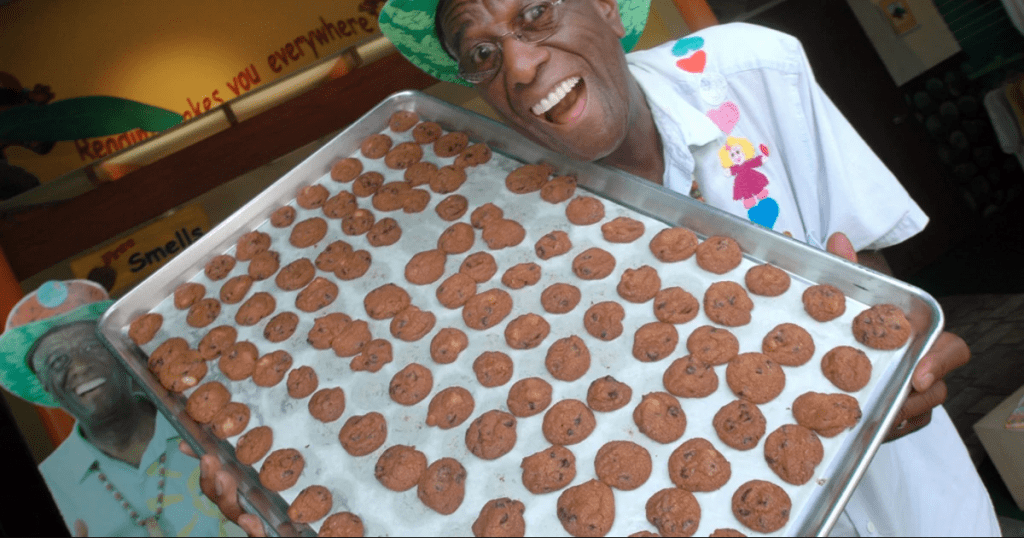
With any great market advancement, a plethora of eager competitors emerge. And shortly after arriving on the scene, Famous Amos was met with rival brands like Mrs. Fields, and new, upmarket product lines from Nabisco and Duncan Hines.
Combining these market competitors and Amos’s inability to keep up with his success led to the first cracks in the business. By 1985, Famous Amos reported a $300,000 loss on sales of $10 million.
Later that year, Amos officially gave up the reigns of his company, selling a majority stake to Bass Brothers Enterprises for $1.1 million.
Two years later, the new owners upended the recipe entirely, adding preservatives and shelf-stable ingredients. Famous Amos was rebranding as an affordable brand. It wasn’t entirely unexpected; such mission-statement-defying practices are common for newly bought companies, but the decision prompted original owner Wally Amos to depart.
In 1992, President Baking Company bought Famous Amos for $61 million—more than 55 times what Wally Amos sold his controlling stake for just a few years earlier.
Amos wasn’t through with the cookie business, however. Later in 1992, he launched his new venture…
And was promptly sued.
Turns out: the latest Amos product— Wally Amos Presents Hazelnut Cookies— stood in direct violation of the contract he had signed years prior when selling his first business. The one that expressly prohibited Amos from using his own name and likeness in the selling of any product.
Undeterred, he changed the name of his company, operating instead as Uncle Nonamé. Boldness had treated him well in the past— and I think it’s an undeniably ballsy way to approach being sued over your own identity— but the market operates in mysterious ways. In 1996, Uncle Nonamé filed for bankruptcy.
What Became of Wally Amos?
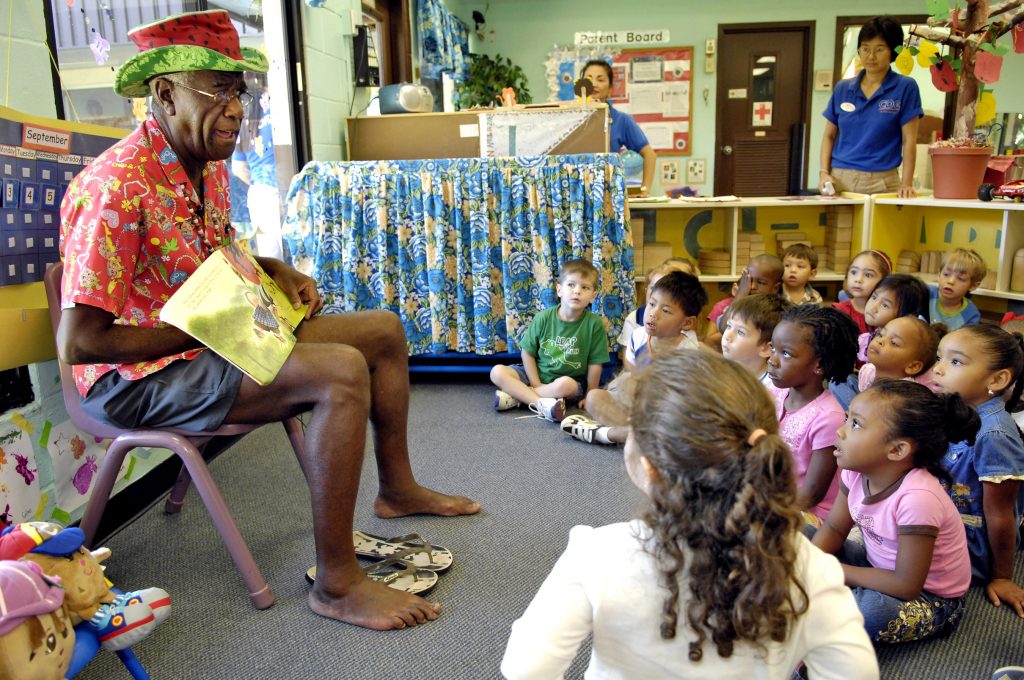
By 1999, Amos was in talks with Keebler, the new owner of Famous Amos. An agreement had been reached: Wally Amos would become a paid spokesperson for the brand under the condition that they craft the recipe closer to the original.
And it feels like a solid ending to the story. The sweet embrace of a father and son after a long, arduous journey, complete with lawsuits, bankruptcies, and foreclosure. Ending up together would be fitting— if a bit too good to be true.
“It was bittersweet,”
says his son, Shawn Amos.
“He was happy to be back in the center of the brand he started, but he also had a hard time accepting the fact that at the end of the day, he was just a paid spokesperson.”
The feeling of being alienated from one’s own brainchild eventually led to a short-lived reunion between Amos and the brand that bears his name.
After leaving once and for all, Amos pivoted to making muffins with Uncle Wally’s Muffin Co., opening a bake shop in Hawai’i.
Amos wrote multiple books about his experience over the years, including Power In You, Man With No Name: Turn Lemons into Lemonade, and The Famous Amos Story: The Face That Launched 1,000 Chips. He has also been a vigorous advocate for literacy and was granted a National Literacy Honors Award by President George H.W. Bush.
At age 80, Amos appeared on the hit television show, Shark Tank, pitching another new business, “The Cookie Kahuna”. The business ultimately failed.
In 2017, he launched a GoFundMe, announcing he was struggling to pay for food, gas, and rent.
No longer famous, Wally Amos continues on with his baking and entrepreneurial spirit. His life is a statement of hard work and resilience, but also a cautionary tale about success, hubris, and the risks we make along the way.
Business
5 Questions To Ask About Financial Sustainability
Published
3 years agoon
September 19, 2022
When it comes to financial sustainability, you’re going to want to know as much as possible. As the negative effects of climate change exacerbate, financial sectors are (finally) starting to shift their investments toward Environmental, Social, and Governance (ESG) considerations.
Sustainable finance is the process of taking ESG considerations into account when making viable investments. That means putting money into companies that develop renewable energy, hire and promote employ members of marginalized communities, and infrastructure that will help protect humans in at-risk environments.
This is a very serious, very complicated issue that we are running out of time to meaningfully tackle. There is also the risk that many of these efforts are performative (see: greenwashing), we have to make sure we are keeping those in power accountable.
Once again, we bring in our favorite finance expert, Danetha Doe Chief Economist at Clever Real Estate and creator of Money & Mimosas. There is a lot to consider when financing sustainability – and she’s here to break it down in a digestible way.
Here are 5 questions you should ask when considering financing sustainability, as explained by Danetha Doe.
Are these investments profitable? Or is this just charity for rich folks to pat themselves on the back?
Imperial College of London’s business school ran a multi-country analysis comparing the returns from each country’s largest fossil fuel and renewable energy stocks over the last 10 years. They found that renewable energy stocks delivered higher returns for both 5 and 10-year time periods.
Some people such as Kara Swisher and Chamath Palihapitiya think the next trillionaire will be someone that cracks a major problem in green energy. And for better or for worse, Elon is the richest person in the world based primarily on Tesla’s value.
All this to say, the answer is YES. You can care about the planet and make money at the same time.
Will these investments actually help the environment in tangible ways? How soon?
Broadly, yes, these investments will help – and are helping – the environment in tangible ways. Investing in solar panels, rainwater harvesting, and electric vehicles while divesting from fossil fuels will help to reduce the pollution from power plants.
The timeline of course correcting the damage that has already been done depends on a lot of factors. addition to investments from individuals, we need governmental bodies, Wall Street, and other parts of the private sector to continue to get on board.
President Biden’s Inflation Reduction Act includes environmental measures that will go a long way to support climate change efforts. The fashion industry, one of the biggest pollution culprits, has started to place a bigger emphasis on resale which will help to reduce waste. Wall Street has pumped out ESG funds that are more greenwashing than helpful, so we will need to hold them accountable.
As an individual, the way you choose to spend and invest your money will go a long way because it will force corporations to prioritize sustainability efforts.
Will taxing the wealthiest people their fair share help? Would something like a ban on private jets help?
The short answer is maybe. The corporate tax structure may need to be reviewed, but I’m a bigger fan of adding fees to resource use to cover the externalities and then redistributing those funds to climate change efforts. For example, Kourtney Kardashian exceeded her water allotment budget by 101,000 gallons in June. Instead of increasing her base income tax percentage, maybe there’s a fee of $1,000 for each gallon over the allotment budget. The $101,000,000 fee is then redistributed to technology companies solving the freshwater scarcity crisis.
Instead of banning private jets, you should have to pay a carbon fee for each ride. These fees might not stop the behavior, but they could finance the changes needed to get us to a greener future.
There are wealthy people who are actively trying to help with climate change efforts. Instead of penalizing all of them with a blanket tax, I suggest adding fees to resource use.
What kind of expenses will we be looking at if we fail to address climate change?
Deloitte’s report shows that inaction will cost the U.S. economy $14.5 trillion by 2070. Utility officials in Illinois estimate the warmer summers could cost locals an additional $11 billion over the next 30 years. By 2040, extreme heat in Arizona could add up to $110 to residents’ electric bills each year, according to the Environmental Defense Fund.
The Federal Reserve Bank of Chicago predicts homeowner’s insurance premiums to rise due to climate change. In fact, some insurers have already stopped covering parts of California deemed too risky because of wildfires
Why me? Why do I have to make these changes? Should it just be the corporations since they’re the ones ruining the world?
This is an all-hands-on-deck scenario. Corporations should be held accountable, but they do respond to your spending and investing decisions. Greenwashing wouldn’t exist if corporations thought no one cared about the environment. At the very least, be selfish and think about the fact that the quality of the environment directly impacts you. The more you do your part, the greater chance you’ll have at being able to enjoy the beautiful outdoors without worrying about fire smoke ruining your lungs or extreme flooding wiping out your island vacation home.
Where Do We Go From Here?
Investing in ESG is critical – but we have to be selective where we divest and relentless in our pursuit to ensure accountability. Further things to consider when financing sustainability are:
- Are these ESGs contributing to organizations or projects that counteract environmental harms perpetuated by the company? Or are they arbitrary investments that let them greenwash their reputation/only investments that provide “accreditation” over genuine impact?
- Are ESGs investing in genuine solutions, or projects that perpetuate inequities and environmental harm?
- Are companies engaging with ESGs also changing their own practices? Probably not: “They found that the companies in the ESG portfolios had worse compliance record for both labor and environmental rules. They also found that companies added to ESG portfolios did not subsequently improve compliance with labor or environmental regulations.”
- Also – looking at ESG investments relative to a company’s other investments is imperative.
We send many thanks to Danetha Doe for her expertise in the financial field and her lovely disposition. Be sure to check out Money & Mimosas for other financial tips!
Big thank you to Molly Blondell for her perspective on sustainable finance as an expert in the field.
We can solve the climate crisis – we have a lot of work ahead of us. Get involved in your community, start in your neighborhood. Organize a clean-up, press your local officials to get serious about recycling programs, any little thing you can do helps.
Let’s get to work.

Should I Buy an Electric Scooter? What You Can Learn

Best Workflow Mapping Tools for Smarter Business Processes

Top White Label Marketing Tools for Agencies: Our 10 Best Picks

Virtual Reality Exhibit Carne Y Arena: The Refugees’ Plight

Top 10 Podcast Editing Software Applications for Beginners

What Is Tiktok Pink Sauce? The Viral Condiment, Explained

Did You Drop Your Smartphone in The Ocean? Here’s How to Retrieve It

Top White Label Marketing Tools for Agencies: Our 10 Best Picks

History of the NBA: The Success Behind the Big League

Demio SaaS 2025 Review: Features, Pricing, Pros & Cons

Did You Drop Your Smartphone in The Ocean? Here’s How to Retrieve It

Virtual Reality Exhibit Carne Y Arena: The Refugees’ Plight

Best Workflow Mapping Tools for Smarter Business Processes

Gift Guide: 25 Best Gifts for Women for All Occasions
Trending
- Technology17 hours ago
Top White Label Marketing Tools for Agencies: Our 10 Best Picks
- Technology22 hours ago
Virtual Reality Exhibit Carne Y Arena: The Refugees’ Plight
- Technology16 hours ago
Best Workflow Mapping Tools for Smarter Business Processes
- Technology23 hours ago
Top 10 Podcast Editing Software Applications for Beginners
- Lifestyle6 hours ago
Should I Buy an Electric Scooter? What You Can Learn



